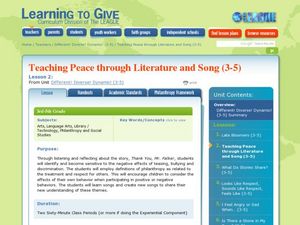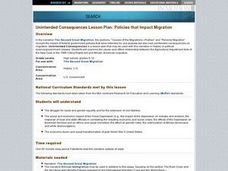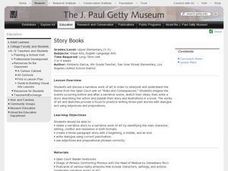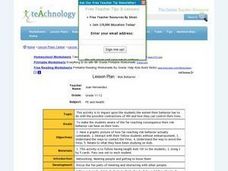Wisconsin Historical Society
Civil Disobedience
When is civil disobedience acceptable? Class members read examples of Jim Crow laws, an excerpt from Dr. Martin Luther King's "Letter from a Birmingham Jail," and a newspaper article and then consider the factors that make a law just or...
Museum of Tolerance
My Experience with Injustice
As part of their preparation for a visit to the Museum of Tolerance, individuals are asked to write about a time when they witnessed or experienced unjust, biased, or prejudicial treatment. A great way for writers to make a personal...
University of California
The Vietnam War (1945 – 1975)
Have you ever wanted to do something so perfectly you wound up not doing it well at all? Young historians use primary and secondary documents to analyze the United States involvement in the Vietnam War. The issues surrounding the...
National Endowment for the Humanities
Albert Sabin and Bioethics: Testing at the Chillicothe Federal Reformatory
Do the ends justify the means? Getting a drug approved in the US is a long and involved process. But at some point out, it involves testing on humans. The ethics of such testing is the focus of a resource that uses Dr. Albert Sabin's...
Global Oneness Project
Deconstructing Consumerism
To increase awareness and launch a discussion of consumerism, class members view What Would It Look Like, a 25 minute film of images that capture the global effects of the consumption of goods. Viewers make a list of the images that they...
University of North Carolina
Plagiarism
As many unfortunate journalists have learned, taking someone else's ideas and passing them off as your own is never a good idea. It's called plagiarism—and it's a big deal. Thankfully, a handout helps writers learn how to avoid...
Curated OER
Coho Salmon and Habitat Loss
Learners investigate the issues threatening coho habitat in the BS Interior's Fraser River watershed. They determine how personal choices and actions have environmental consequences. Evaluate human impacts on local ecosystems.
Curated OER
LEAGUE: Learning to Give
Students explore the effects of human actions. In this respect and discrimination lesson, students read Thank You, Mr. Falker and identify the consequences of bullying and teasing. Students then relate personal experiences of hurt...
Curated OER
Unintended Consequences: Policies that Impact Migration
Students examine the cause-and-effect relationship between the Agricultural Adjustment Acts of the New Deal or the 1965 Voting Rights Act and African-American migration. They write an essay evaluating the effectiveness of the Voting...
Curated OER
United States-Japanese Relations in Post World War II Era
Ninth graders analyze political cartoons and posters relating to the United States and Japan in the period following World War II. They discuss the positive and negative consequences of the United States occupation of Japan.
Curated OER
The Work of our (Divine) Hands
Young scholars explore ethical "mitzvots." In this philanthropy lesson, students consider how to lead their lives ethically according to the dogma of mitzvot. Young scholars discuss the consequences of their actions.
Curated OER
Japanese Internment Camps in the US During World War II
Eighth graders analyze the impact of the Japanese/American conflict during World War II on the Japanese American population and evaluate the consequences of government action regarding international conflict. Students demonstrate their...
Curated OER
What If We Run Out?
Students explore the consequences of shrinking habitats and the human impact on wildlife populations. They participate in a game to study the consequences and describe the preservation of animal habitats.
Curated OER
Decision Making, Take a Seat or Get off the Bus
Fifth graders explore the positive and negative consequences of choosing to fight against discrimination. They read the story of Rosa Parks. Students discuss the movement against segregation. Students read other books about...
Orange County Department of Education
Nights of the Pufflings
Third graders read the story to identify the problem and solution that occurs in Night of the Pufflings. They identify problems within the story that are solved through the characters' responsible actions. Students describe in their...
Curated OER
Playing By The Rules
Learners investigate the meaning of honesty. In this character education lesson, students brainstorm school experiences where they have the choice of being honest. Learners illustrate and describe actions related to honesty in a journal.
Curated OER
Steps to Responsibility
Sixth graders explore the steps in decision making and responsibility. In this lesson, 6th graders analyze a scenario and decide what actions should be taken. Students write in their journals.
Curated OER
Story Books
Students discuss a narrative work of art, then write stories describing the action and publish their stories and illustrations in books.
Curated OER
Hopper Hunt: IPM Decision-making in Alfalfa
Learners describe migrations and life cycle pattersn of a key alfalfa pest, the Porato Leafhopper. They define the Economic Inquiry Level and Economic Threshold. Students evaluate data in relation to profit as it applies to IPM. They...
Curated OER
I Don't Think We're in Kansas Anymore (Grades 2-5)
Learners give examples of erosion and weathering processes. They determine causes of America's Dust Bowl phenomena.Students define erosion as the condition in which the earth's surface is worn away by the action of water and wind.
Curated OER
Napoleon Forges an Empire
In this world history activity, learners note the goals and results of 5 of Napoleon's actions and write a brief explanation of how he gained power in France.
Curated OER
Acting it Out
Middle schoolers explore responsible behavior. For this character education lesson, students work in groups to act out scenarios using or disregarding responsible behavior. Middle schoolers discuss personal feelings and consequences of...
Curated OER
Risk Behavior
Students explore information about HIV and how the possible contractions of the disease can control their lives. The Far reaching consequences of risk behavior are discussed.
Curated OER
Touching Spirit Bear
Designed to be used in conjunction with a reading of Ben Mikaelsen's Touching Spirit Bear, the worksheets and activities in this 32-page packet focus readers' attention on how to break the cycle of violence and develop more productive...

























